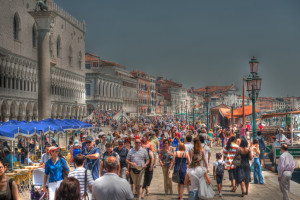Why every city in the world doesn’t think tourists are a jolly good thing
There’s an interesting backlash against the ceaseless urge to seek out authenticity in foreign parts: cities are trying to keep out visitors.
On Bloomberg View, Leonid Bershidsky described attempts by cities like Barcelona, Berlin, Lisbon and Hong Kong to limit the number of overnight visitors they receive every year.
He said that the problem is seen as acute, mostly because of the disproportionately large numbers of short-stay visitors in relation to a city’s population.
According to Mr Bershidsky’s figures:
- Barcelona was the world’s 11th biggest destination for overnight visitors in 2014 (7.37 million, more than four times the city’s population).
- Lisbon expected 3.6 million overnight foreign visitors in 2015 (about 6.5 times its residents).
- Berlin received 4.5 million foreign overnighters in 2014 (a million more than its population).
- Hong Kong received 8.84 million overnight international visitors in 2014 (about 1.7 million more than its population).
He offers an interesting analysis of these four cities’ reluctance to allow in too many visitors (unlike, for instance, Paris, London and Bangkok).
Where once the traveller scoured the countryside for bucolic charm, now, it seems, intrepid urban tourists are undeterred by blue-collar areas, local incomprehension (of their needs and of their accents) and the fact that they stick out like sore thumbs.
Instead, they want the complete “experience” of a city, a value-for-money endeavor that eventually prompts gentrification of parts that prefer to be what they are – genuine grunge rather than the faux variety.
In some ways, I suppose, that’s to be expected. Oxford Economics projects significant growth in aviation through 2030, with passenger numbers expected to reach 5.9 billion, which is about double the numbers of 2013.
That’s a lot of cities to trawl for the ‘real’ experience.


